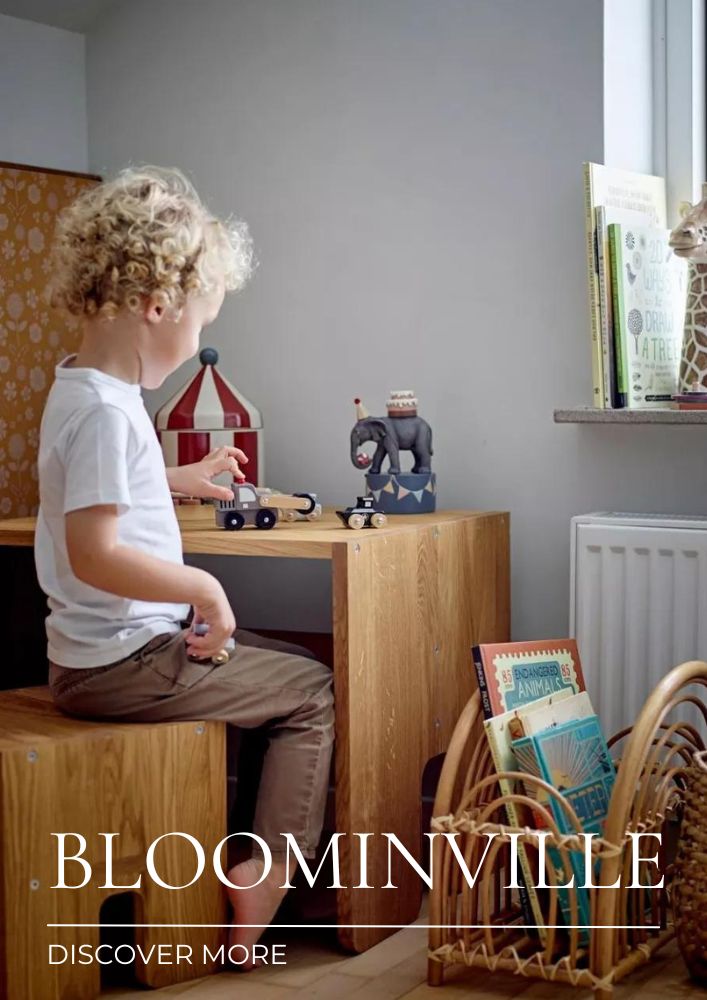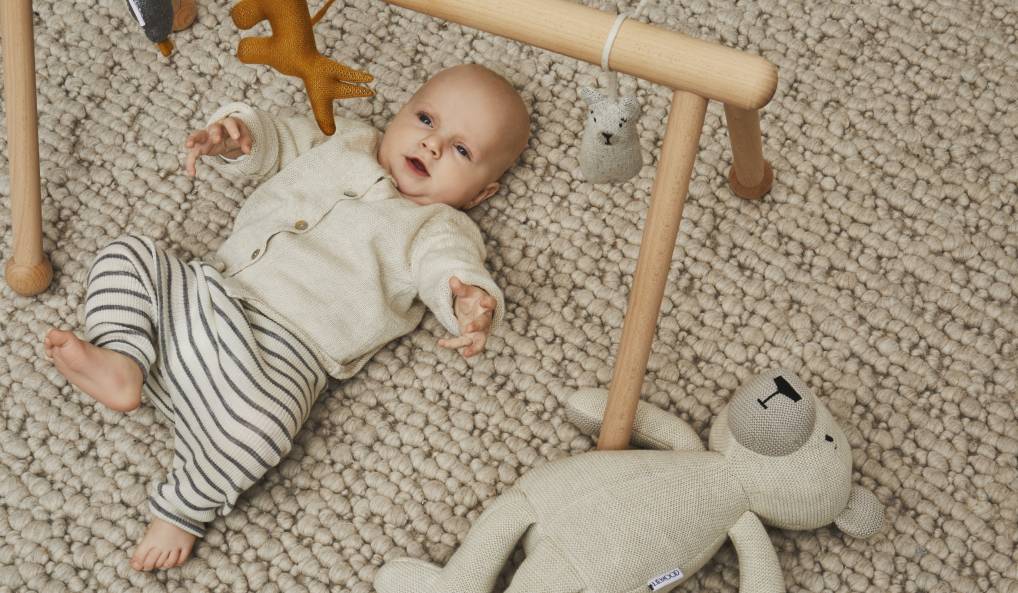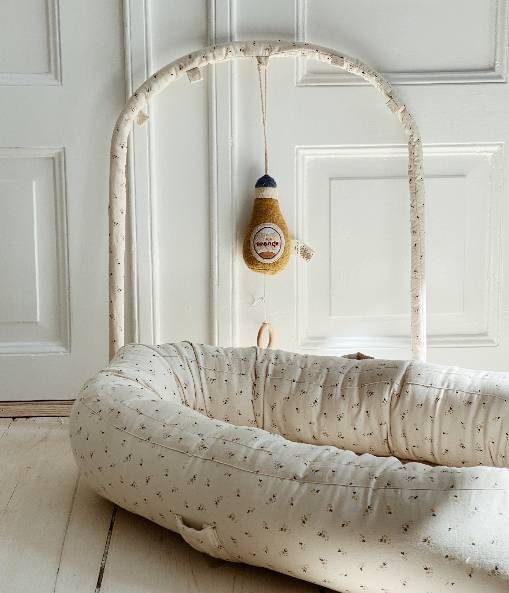- Fashion
- 0 likes
- 3746 views
- 0 comments
Baby's Sleep Guide
Sleep: Great healer, rest and time to think. It is as important to our body as eating, drinking and breathing. Sleep is even more important for babies, and the need for it varies with age. Getting your baby enough sleep positively impacts everything from their development to their mood and social interactions.
"Sleep is important for brain and body regeneration," says pediatric nurse Marie Svahn. “When we sleep, we process all the day's events, new experiences, and store knowledge and memories. Sleep also affects the immune system. Not getting enough sleep affects both children and adults and can leave us very tired and irritable.”
Children who have had trouble sleeping for a long time may find it harder to control their mood and may also feel sad, frustrated and anxious. Older children may become more impulsive and more outgoing.
Adults also feel the effects of poor sleep. They may become lethargic, lose their appetite, and feel depressed. If you experience these problems, ask your pediatric nurse for help, don't be shy to ask friends and relatives for help so you can get some sleepless nights at least once. It can be as simple as asking a friend to come and cuddle your baby while you nap next to him on the couch. Remember that our offer includes not only products for children but also for adults. You can choose the perfect ecological bedding not only for your baby but also for yourself. Garbo & friends, Konges Slojd and Numero 74 products will help you choose ecological products made of sustainable materials.
What can you expect between birth and three months of age?
Newborns sleep a lot! You'll probably find that they spend more time sleeping than awake during those first few weeks. These closed eyes are essential to their early development and help them process life outside the womb, waking up to learn more about the world they came into. Every baby has their own individual sleep cycle, which will most likely be different from other babies you know.
Newborn sleep: There may seem to be no rhythm or specific cause. It is easy for a baby to wake up because he is in active sleep, a light sleep where his eyelids may flutter and his breathing is irregular. Occasionally, they may twitch or make small noises such as grunts or cries. They usually sleep for shorter periods, from 30 minutes to about four hours, at seemingly random times of day and night.
It's not unusual for them to sleep 16 to 18 hours a day. At four weeks of age, this drops to about 14 hours. This is usually split between 8-9 hours during the day and around 8 hours at night. Instead of one long sleep, this sleep is also divided into 1.2 hour intervals. Most do not start sleeping through the night until they are three months old or weigh between 6 and 6.5 kilograms. About two-thirds of babies can sleep through the night on a regular basis by the age of six months.
"Research suggests that babies who theoretically sleep through the night wake up several times a night," says Marie. "But they don't need their parents' help to get back to sleep, which means their parents don't notice their baby is awake at all." This contrasts with babies who want to be close to their parents and cry until a parent comes to them and then need help getting back to sleep. This is an area where many children are different from the start."
How much sleep does a newborn need?
We remind you once again that every child is different and has different needs. Newborns also have the greatest variation in the amount of sleep they need. Babies aged 0 to 3 months typically sleep 16 to 18 hours a day. Their small stomachs cause them to wake up for food 2-4 hours apart around the clock. There are many products for children on the market, but some of them stand out in terms of production and materials used. Teats, teethers and bottles from the Mushie brand guarantee excellent materials. Made of harmless natural rubber.
If you have concerns about how much or how little your newborn sleeps, talk to your doctor about it, but keep in mind that many healthy newborns sleep more or less than average.
Where should my newborn sleep?
Small children up to three months of age sleep best in their own bed. They always have to be put to sleep on their backs before they can turn around on their own. Studies have shown that this reduces the risk of Sudden Infant Death Syndrome (Cot Death).
There should be nothing in the cot except a firm mattress and a tight-fitting sheet. The safety standard is not met if at least two fingers can fit between the mattress and the cot. Do not put any soft pillows or soft toys in the crib as there is a risk of suffocation.
Some parents prefer the carrycot during the neonatal period. They are smaller and some are portable so you can carry them with you around the house. They also allow you to place the carrycot next to the bed so that your baby can sleep close to you without being in bed with you.
How to practice safe co-sleeping
Some parents prefer to have their baby in bed, a practice known as "Co-sleeping". Many babies also sleep better when they are close to a parent.
“At this stage, you can share a bed with your baby. It is best, however, if the child sleeps higher in the bed, close to the parents' heads, says Marie Svahn.
If that's your preference, the bed should provide a safe space.
For safe co-sleeping, we recommend:
• Do not place soft objects in the sleeping area that could make it difficult for the baby to breathe or cause overheating (for example, pillows and blankets)
• Make sure that the child does not fall off the bed or get stuck between the wall and the mattress
• Do not let pets or other children in your bed
Establishing a routine in a newborn
Sleep is governed by circadian rhythms, 24-hour cycles that are part of the body's internal clock. Much of this rhythm is driven by exposure to daylight, which regulates your body's internal clock and makes you feel more awake and alert during the day. The darkness tells your body it's time to calm down.
Most adults are in sync with light and dark after a lifetime of training, but it's not the same with newborns. In the womb, the baby's sleep schedule follows the mother's physiological cues for day and night. When the mother is moving and awake, the baby's heart and breathing speed up. They slow down when the mother sleeps.
Melatonin crossing the placenta can also affect the baby's internal rhythm. After birth, they no longer have this hormonal cue and must develop their own circadian rhythm. This can take a good 12 weeks if not longer. Be prepared to wait five months for them to become tame at night, e.g. sleeping more than five hours at a time.
Getting your child into a routine
“Parents and children work together to create their routines based on their need and ambition level,” says Marie. “Routines are good for kids because they learn through repetition. Doing the same routine every night creates a sense of security because the child knows what to expect."
Including them in the hustle and bustle of daily activities and exposing them to the daylight can help them adapt to their routine more quickly. An evening routine might start with a bath or wash, putting on pajamas, an evening meal, and a bedtime story or lullaby. You can also try a massage to help him develop mature patterns of melatonin secretion.
It is recommended that the child has about an hour to rest and relax before going to bed. If they wake up during the night to feed, keep activity to a minimum. Make as little noise as possible and limit sudden movements that can wake your baby up completely.
“Parents need time to fully get to know their baby, but it's good to teach them the difference between day and night in the first few months. It's bright and noisy during the day. It is dark and quiet at night. Keep the lights on as low as possible at night and keep your voice low during evening and nighttime nappy changes,” Marie advises.
Believe it or not, not all babies really know how to fall asleep. Knowing the signs to look out for can help teach your baby to fall asleep on his own. This may include rubbing your eyes, yawning, and looking away.
It's not a good idea to let your baby fall asleep in your arms. They may get used to it and expect to need to be held up at all times to fall asleep. It also means that they may not be able to fall asleep on their own if they are briefly awakened during their sleep cycle.
Baby's sleep from three months of age
After three months, you will notice a significant change in your baby's sleep patterns. Unfortunately, the third to sixth month can prove to be the most difficult period of sleep. During this time frame, your baby's sleep will resemble adult sleep, with periods of light and deep sleep. Here is an overview of what you can expect, although always remember that we approach each child individually.
• 3-4 months: Babies begin to have more regular sleep patterns that match the time of day and night. They still need plenty of sleep, between 15 and 18 hours a day
• 4-6 months: babies can start sleeping 5-6 hours a night and still need a total of 15-18 hours of sleep a day
• 6-12 months: Babies still need 15-18 hours of sleep a day, but can start sleeping between 9-12 a.m.
• 1-3 years old: Toddlers of this age need about 12-14 hours of sleep a day
• 3-6 years: children need 11-12 hours of sleep per day
Feeding the baby at night
Toddlers up to four months of age are usually breastfed or bottle-fed at night. This is partly because they are hungry, but they also need human contact and comfort. After four months, they no longer need to eat at night as long as they are gaining weight (most babies should reach 5.5 - 6 kilos, which is the weight at which they no longer need to eat at night). Many babies still want to eat at night, so it's up to the parents whether or not they continue to feed at night after this age.
Take a gentle approach to weaning your baby off night feeds. If you want to reach the stage where your baby is given his first feeding session or bottle when he wakes up, several feedings throughout the day and another feeding just before bedtime. Gradually working on such a schedule will make the transition easier for everyone and means less discomfort for you if you are breastfeeding.
One way is to add an extra 15-30 minutes between each night feed. Your baby should start sleeping longer each time, which will eventually cause the baby not to wake up for feeding. You can also try giving them more food throughout the day to keep them feeling full or comforting them in other ways, such as holding or rocking them.
Baby sleep regression
Just when you think you've established a routine, your baby starts waking up frequently in the night and refusing to nap. Sleep regression can occur at any age, but typically occurs at 6 weeks, 4 months, 8-9 months, 15 months, 18 months, and 2 years.
Let's start with the fact that the 4-month sleep regression is a constant change. As for other sleep regressions, these ways can help you cope without losing any progress you've made so far:
• Growth spikes can be associated with regressions, so don't be afraid to offer extra meals to your child. It won't last forever and you'll soon be back on your hard-earned schedule
• Comfort them, but don't fall back into old habits: cuddle them, but if you've managed to wean your baby off the pacifier, don't be tempted to offer it during sleep regression
• Ask for help! If your baby doesn't sleep at night, he's not the only one who gets tired. Ask your partner, friends or family members to help with your baby or household chores
When should I move my child to his own room?
Babies can sleep in their own crib from the start, if you wish. If you have a baby who wants to be close to you, getting them used to sleeping apart can be a time-consuming process.
Around 6-7 months is the age when a child can move to their own room, after this time the child begins to get more used to the environment and struggle with the change. However, after 8 months, they may become more depressed if no one is around.
"One option is to put your baby to bed when they're drowsy and want to go to sleep, but before they actually fall asleep," Marie suggests. “You can then stroke your baby's back until he falls asleep. Sometimes they need to be picked up, comforted, and then put back down when they calm down. It may take time for your child to get used to this, but it's important that you can show that you are there for them."
What if they have a nightmare?
Nightmares are quite rare, but most common between the ages of 3 and 12. They usually appear about an hour after falling asleep, but can occur later. Nightmares are not dangerous, but they can be irritating.
Signs that they are having a nightmare include screaming and appearing scared. They may wave or push you away when you try to comfort them. These episodes can last up to 20 minutes and they won't remember them the next day
The following steps may help your child cope after a nightmare:
• Your presence lets them know they are safe
• Listen to them and explain what happened
• Comfort them with mood lighting and cuddles
To sum up
Sleep problems are not easy to deal with and require a lot of hard work from both parent and child. Pediatric nurse Marie Svahn reassures that these problems are not permanent. You can make this time more pleasant for your child and yourself by supplying yourself with the necessary, natural products.
Make sure you only buy good quality organic products.
Recommended brands for children and adults:
“Many times I wish I could have given others the same advice. Parents tend to sleep poorly even for several years as the toddler grows up. The memory of those hard nights will pass. Perhaps it will be comforting to know that in the midst of all this sleepless storm you will one day be able to rest.”













_1.jpg)
_1.jpg)
.jpg)
.jpg)
.jpg)
.jpg)

.jpg)
_1.jpg)
_2.jpg)




















Comments (0)